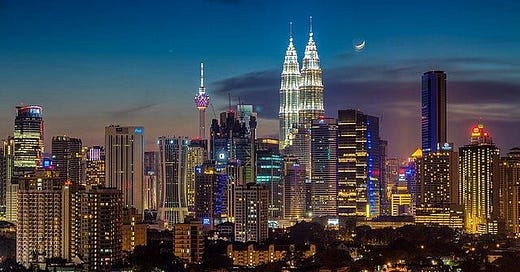Posts that one might have missed during the festival CNY week are in the following sites:
1] csloh.substack :
ii) AI Financialisation - implications for Global South
iii) Every human life is a life
iv) Sarawak - the development of underdevelopment
vii) MADANI Core Values
2] MOMENTUM #238
3] STORM'S PUBLICATIONS:
a) Pramoedya Ananta Toer - a brief background;
b) A short comment on identity politics;
c) From NORAD to the Iron Dome - strategic hegemony over Arctic Circles;
d) China’s transitional economy from capitalism to socialism;
e) Healthcare for hinterland communities; and a rainstorm video: on community clinic and telemedicine (one-minute);
f) Sabah development of an underdevelopment of a state where the stormcloud's podcast version was also produced, but has since incorporated in the rainstorm's one-minute trial video version; an abridged critique is reproduced below:
Dependency and Underdevelopment ( Andre Gunder Frank, Samir Amin)
Sabah’s economic stagnation can be analysed as a product of dependent development, where its role in the Malaysian economy is akin to a periphery in a core-periphery structure.
Comprador Capitalism and Ethno-capitalism
The concentration of economic power in Sabah’s political-business elite aligns with comprador capitalism, where local capitalists act as intermediaries for global capital rather than fostering autonomous development.
Monopoly-Finance Capitalism ( Baran & Sweezy, Foster)
The development of Sabah's economy is constrained by financialisation and rent-seeking, where capital accumulation is directed toward speculative investments rather than productive industry.
Unequal Exchange and Labour Exploitation
The reliance on cheap migrant labor (especially from the Philippines and Indonesia) ensures that Sabah remains a site of super-exploitation, where wages are kept low to maintain Malaysia’s competitive advantage in global markets.
Spatial and Urban Inequality ( Henri Lefebvre, David Harvey )
Sabah's urban centers suffer from unequal spatial development, where infrastructure investment is concentrated in tourism and real estate projects rather than working-class housing, public services, or sustainable industries.
In short, it's a Gramscian situation where federal government’s economic policies act as a form of passive revolution, where reforms (e.g., infrastructure investments, autonomy talks) are used to co-opt dissent while maintaining the existing economic order.
[Note: The essay version has embedded references and a list of cited sources].
Kindly share this edition with your peers and respective diaspora communities.
in solidarity,


